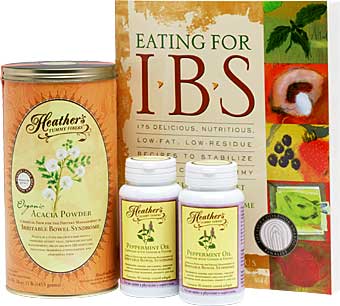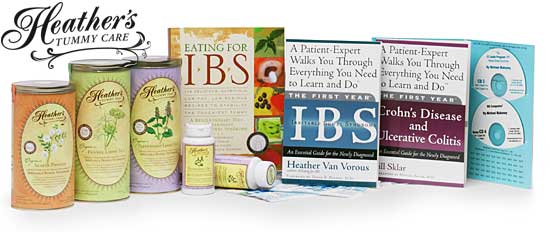| |
 |

For IBS Diarrhea, Constipation, Pain, & Bloating!
Stock Up! Bargains On All
Tummy Care Favorites!

Heather's Tummy Tamers
Now at CVS Pharmacies!
Speak Up, Act Now

Heather's Tummy Care works to end the deaths of albatross chicks from plastic ocean garbage.

Heather's Tummy Care works to end elephant slaughter.
Speak Up, Act Now
|
 |
|
| |

June 17, 2015 ~ Scroll down for full newsletter or follow the links:
Special Letter »
An Eye Opener That Helps So Much!
IBS Recipe »
Passionate Mango Probiotic Smoothie
Ask Heather »
Good Antibiotic for IBS? Rifaximin, Bacterial Overgrowth, More!

|
|
Enjoy the newsletter!
~ Heather Van Vorous
|
Did a friend send you this newsletter? Sign up here for your own free subscription.

Passionate Mango Probiotic Smoothie An easy, delicious, IBS-friendly smoothie that gets you prebiotics, probiotics, and soluble fiber all at once. This is a wonderfully exotic sweet-tart drink great for breakfast, snacks, and even dessert!
Makes 2 Servings (easily doubled)
1/4 cup vanilla soy or rice yogurt with live cultures
2 teaspoons Acacia Tummy Fiber
1 teaspoon honey
5 tablespoons passion fruit juice, bottled or fresh-squeezed from about 8 passion fruits
2 cups diced, peeled mangoes (Champagne variety if available)
Stir together the yogurt and Tummy Fiber. Add to all other ingredients in a blender or food processor and puree until very smooth. Serve immediately.
Are you just learning how to eat for IBS? A little intimidated at the thought of special IBS recipes? Not quite sure just what makes these recipes special in the first place? Don't worry! Get Eating for IBS and find the answers to all your questions.

Try the IBS Diet Kit #2 - for Diarrhea AND Constipation!
Five Star Reviews! 
* Eating for IBS - the Groundbreaking Diet and Cookbook
* Organic Acacia Tummy Fiber ~ for IBS Pain, Diarrhea and Constipation!
* Peppermint Oil Tummy Tamers with Fennel Oil ~ Prevent Bloating and Gas!
 An Eye Opener That Helps So Much!
An Eye Opener That Helps So Much!
I have been struggling with IBS for over 10 years and have lived in misery. I recently ordered the book Eating for IBS. I have tried so hard for so long to figure out what my trigger foods were with little success and this book was an eye opener for me. I was crying by page 30!
This book is going to help me sooooooo much. Thank you, thank you to Heather!
I take a medication for my IBS, but I am hoping by taking all the advice in the book I can live my life without medication.
I just wanted to say thank you and I am so happy to find this kind of help and support after all these years.
Christina M.
Thank you so much, Christina! This truly makes my day! ~ Heather

Recently, there has been a lot of confusion surrounding antibiotics and IBS. Many people with IBS have had bad experiences with antibiotics of all kinds. The drugs often cause GI side effects and can make IBS symptoms much worse. But lately, there has been a flurry of news and research suggesting that a specific antibiotic might actually help IBS. What's all this about? ~ Heather
In part one of our special series on antibiotics and IBS, we covered the bad guys.
Traditionally, broad-spectrum antibiotics (prescribed for all kinds of infections, to children and adults alike) often cause mild to severe gastrointestinal side effects, even for people who don't have IBS. This is because those drugs not only kill the bacteria causing the infection you're treating, but they also kill the friendly bacteria, called "flora", that live in your intestines.
These friendly bacteria normally regulate the consistency of stools and help with digestion. There is a growing mountain of research that this gut flora is actually of critical importance not just for bowel health, but overall disease resistance as well.
However, an antibiotic called Rifaximin (brand name Xifaxan) was recently approved by the FDA as a treatment for IBS - specifically, for IBS abdominal pain and diarrhea in adult women and men. What's going on?
Rifaximin is a broad-spectrum non-systemic antibiotic, which means that little of the drug will pass through the gastrointestinal wall into circulation. It has been approved by the FDA and prescribed for years for preventing and treating traveler's diarrhea caused by E. coli, and has few side effects with this use.
Over the past several years, Rifaximin has also been studied in several clinical trials as a treatment for non-constipation IBS, with some interesting results. One of the lead researchers, Dr. Mark Pimentel of Cedars-Sinai Medical Center in California, has been a strong proponent of Rifaximin and has gone so far as to say he believes that the "missing link," or root cause of most IBS symptoms, can actually be attributed to an overgrowth of bacteria in the small intestine.
In fact, initial studies of Rifaximin and IBS were based on the researchers' hypothesis that a large proportion of IBS patients had small intestinal bacterial overgrowth (SIBO). Initial studies actually reported SIBO in up to 80% of IBS patients.
However - as a rule, IBS should only be diagnosed when other disorders that can cause similar symptoms - including SIBO - have been ruled out. Unfortunately, diagnosing SIBO can be difficult. The most common diagnostic procedure, a hydrogen breath test, can have a high rate of false positives.
When subsequent IBS studies used the standard method of jejunal aspiration and bacterial culturing to diagnose SIBO, the small intestinal bacterial overgrowth was found in only 4% of IBS patients.
Clearly, this is a murky area of IBS. Small intestinal bacterial overgrowth (or SIBO) is normally considered to be a different disorder than IBS, even though the symptoms (abdominal pain, bloating, bowel dysfunction) are strikingly similar. Gastroenterologists vary wildly in their estimates of the number of people diagnosed with IBS who actually have undiagnosed SIBO.
Making matters even murkier is the fact that it's possible for someone to have both SIBO and IBS. Some physicians have already begun to treat patients diagnosed with IBS for SIBO.
Trials of Rifaximin from 2011, published in the New England Journal of Medicine, showed that the antibiotic achieved statistically better results than a placebo for treating non-constipation IBS - but not that much better.
In the Rifaximin group, 41% of patients reported adequate relief of IBS symptoms, versus 32% in the placebo group. In the Rifaximin group, 41% of patients reported adequate relief of bloating, versus 30% in the placebo group. Results were similar for at least 2 of the first 4 weeks of the trials, and in an analysis of relief of symptoms during the 10-week period after the end of the treatment.
An editorial by Jan Tack, M.D., Ph.D. that accompanied the study in the NEJM summarized the good news / bad news aspects of the trials:
Good - The sustained symptom improvements lasting at least 10 weeks, after a short treatment course, are encouraging.
Good - Bloating was one of the symptoms successfully addressed, and bloating tends to be one of the most challenging aspects of IBS.
Bad - The rates of response to treatment are only 9% to 12% better with Rifaximin than placebo, which is in the lower spectrum of what's considered to be clinically relevant.
Bad - Though not all patients have a response with Rifaximin, data suggest that a subgroup of patients may have a substantial response. However, it's unclear how to identify this group.
Bad - IBS is a chronic disorder, and although Rifaximin's effects persisted after the 2-week treatment period, the response over time suggests that there is some loss of effectiveness with symptoms toward the end of the 10-week follow-up.
The FDA apparently shared some of these reservations about Rifaximin for IBS. They withheld approval of the antibiotic for treating IBS diarrhea until 2015, pending data demonstrating how the drug should be used in retreating patients with recurrent symptoms.
So - should you try taking an antibiotic for IBS? This is a question worth asking your gastroenterologist, if you do not have constipation and you haven't responded to other treatments. Ask if there are generic antibiotics that might be comparable to Rifaximin (this may be a much more affordable option, and more likely to be covered by insurance). Ask if you've had the tests to rule out SIBO, and if so, what the results were.
Interestingly, probiotics are also being studied and, in some cases, recommended for both SIBO and IBS. This is also an area worth asking your doctor about, particularly since probiotics don't carry the risks and side effects of antibiotic drugs.
Finally, consider using a prebiotic soluble fiber to help encourage the growth of healthy gut bacteria naturally. This can help keep both IBS and SIBO symptoms under control.
~ Heather


Shop at Heather's Tummy Store for IBS
HelpForIBS.com
The only store that's just for IBS - so we only carry the very best

You're on this newsletter list because you have expressed interest in IBS news and information.
Change your newsletter email address here.
If you are viewing this newsletter on a website and would like to subscribe for email delivery, please "Join the IBS Newsletter" here.
ANTI-SPAM PRIVACY & SECURITY POLICY
HelpForIBS.com
Heather's Tummy Care
80 S. Washington St, #304
Seattle, WA 98104 USA
© 2015 Heather Van Vorous, Heather's Tummy Care. All rights reserved.
USA Copyright Office Registration Number TXU 1-270-858 and others.
|
|
| |